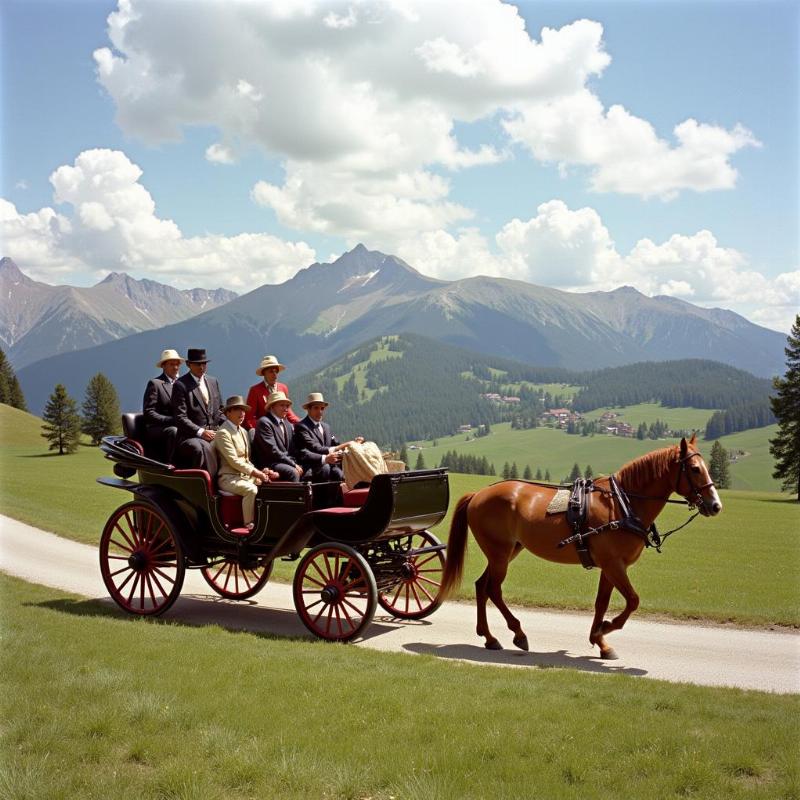Tourism, as we know it, has undergone a fascinating evolution. From the earliest days of travel for pilgrimage and trade to the modern era of budget airlines and Instagram-worthy destinations, the way we explore the world has constantly changed. This article delves into the key milestones in the evolution of tourism, exploring the shifts in motivations, accessibility, and the very essence of the travel experience.
The Early Days of Travel: Pilgrimages and Trade
Initially, travel wasn’t about leisure. Pilgrimages to religious sites and trade routes were the primary drivers of movement. Think of the Silk Road, connecting East and West, facilitating not just the exchange of goods but also of ideas and cultures. These journeys, often arduous and time-consuming, laid the foundation for future tourism by establishing routes and infrastructure.
The Grand Tour: Birth of Leisure Travel
The 17th and 18th centuries saw the emergence of the “Grand Tour,” a formative period in the evolution of tourism. Wealthy young Europeans, particularly from Britain, embarked on extended trips across continental Europe, primarily for educational and cultural enrichment. This marked a significant shift, with travel transitioning from necessity to a pursuit of knowledge and pleasure. karnataka tourism tagline These early tourists visited historical sites, art museums, and immersed themselves in the local culture, setting the stage for modern tourism practices.
 European Grand Tour in the 18th century
European Grand Tour in the 18th century
The Rise of Mass Tourism: Trains, Planes, and Automobiles
The Industrial Revolution democratized travel. The advent of steam engines, followed by automobiles and airplanes, made travel faster, cheaper, and accessible to a wider population. The 20th century witnessed the boom of mass tourism. Package tours emerged, offering all-inclusive deals that streamlined the travel planning process. importance of transportation in tourism This era made travel a mainstream activity, no longer limited to the elite.
The Digital Age: Information at Your Fingertips
The internet and mobile technology have revolutionized how we travel. Online booking platforms, travel blogs, and social media have empowered travelers with information and booking options like never before. e tourism meaning The rise of digital nomads, working remotely while traveling the world, signifies a new phase in the evolution of tourism, blurring the lines between work and leisure.
How has technology changed tourism?
Technology has significantly impacted tourism, making it easier to plan, book, and experience travel. From online booking platforms to virtual tours, the digital age has transformed the tourism landscape. digital marketing in tourism industry This has also led to the emergence of new forms of tourism, such as sustainable tourism and experiential travel.
What is the future of tourism?
The future of tourism is likely to be shaped by factors like sustainability, personalization, and technology. Experiences tailored to individual preferences, virtual reality tours, and a growing emphasis on responsible travel are some of the key trends expected to define the next chapter in the evolution of tourism. posters on tourism
Conclusion
The evolution of tourism is a continuous journey. From the rudimentary forms of travel for necessity to the modern-day pursuit of unique and personalized experiences, the way we explore the world has drastically changed. Understanding this evolution helps us appreciate the complexities of the tourism industry and anticipate the exciting possibilities that lie ahead.
FAQ
-
What is the Grand Tour? The Grand Tour was a traditional trip of Europe undertaken by upper-class European young men of means, primarily from Britain, with the goal of experiencing art, culture and the roots of Western civilization.
-
How did the Industrial Revolution impact tourism? The Industrial Revolution led to the development of faster and more affordable transportation, making travel accessible to a larger segment of the population.
-
What is the role of technology in modern tourism? Technology plays a crucial role in modern tourism, facilitating online bookings, providing information access, and enabling new forms of travel like digital nomadism.
-
What is sustainable tourism? Sustainable tourism focuses on minimizing the negative environmental and social impacts of travel while maximizing the benefits for local communities.
-
What are some future trends in tourism? Personalization, virtual reality, and a greater emphasis on responsible travel are expected to shape the future of tourism.
About PlaTovi
PlaTovi is your one-stop shop for all your travel needs, specializing in crafting unforgettable experiences across India and beyond. Whether you’re looking for traditional tour packages, hotel bookings, flight reservations, or assistance with visa applications, our dedicated team is here to help you plan your perfect getaway. Contact us today to start planning your adventure! Email: [email protected], Phone: +91 22-2517-3581.